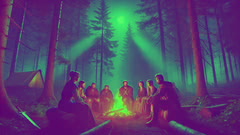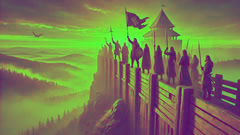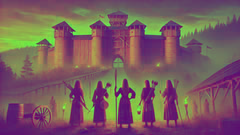Introduction
In the heart of ancient Bohemia, where the forests spread like an emerald sea beneath an ever-changing sky, there linger stories older than the hills themselves. The land remembers—carved into riverbanks, whispered among birches, and rising from the mist that cloaks the Vltava each dawn. Here, strength and sorrow walk side by side, and legends root as deeply as the wild oaks. Of these legends, none stirs the imagination more than the tale of the Maiden’s War: a rebellion of women, fierce and proud, led by Vlasta in the shadowed aftermath of Queen Libuše’s death. Libuše, the wise seer and beloved queen, was the soul of her people—a woman whose visions shaped a nation, whose voice soothed the land’s ancient hurts. When she passed, her absence left an ache that echoed across every village and vale. The realm teetered between grief and uncertainty, and the old wounds between men and women, long smoothed by Libuše’s gentle rule, began to bleed anew. In this fragile moment, Bohemia’s women—warriors, mothers, daughters—found their cause. They had known the taste of justice under Libuše; now, as men gathered in council to decide the future, they saw their own voices slipping into silence. It was Vlasta, fierce as the northern wind and unbowed by sorrow, who rose to lead them. With wit as sharp as any blade and courage that would not bend, she called her sisters to arms. Together, they built a fortress on the hill called Devín, and there, they kindled a rebellion that would shake the land and echo through centuries. This is their story—a story of hope and heartbreak, ambition and sacrifice, where the battle for equality is fought with fire and love alike. The Maiden’s War is not only a tale of weapons, but of hearts in defiance, and the undying spirit of Bohemia.
The Passing of Libuše and the Seeds of Division
Libuše’s reign had been a rare era of peace for Bohemia. She was not only a queen, but a prophetess; her word carried the weight of both law and legend. Men and women alike came to her court for wisdom. Her marriage to Premysl, the ploughman who became king, was a symbol of unity between field and palace, earth and vision. But even as Libuše’s heart faded, the old tensions stirred. Some chafed at being ruled by a woman, no matter her gifts. Others grumbled that her prophecies favored the weak or the foreign. When Libuše died, sorrow swept over Bohemia like a late frost. Her body lay in state for three days in Vyšehrad, wrapped in linen and heather, as all the realm mourned. Yet in the flickering candlelight beside her bier, the seeds of discord took root. The council of elders—nearly all men—gathered to decide what would come next. Voices were raised. Should Premysl continue alone? Was it time for a new king? In village after village, women found themselves pushed from the fireside discussions, their ideas dismissed or met with silence. At first, grief held them quiet. But as days passed, and it became clear that the world they’d known under Libuše was slipping away, frustration kindled into anger. Among them was Vlasta, a woman of sharp intelligence and quiet strength. Daughter of a woodsman, she had grown up listening to her mother’s stories of Libuše’s justice and her grandmother’s tales of the old matriarchal clans. Vlasta was neither noble nor courtly, but she possessed a charisma that drew people like moths to a lantern. Where others saw only the gathering storm, she saw opportunity—an opening to preserve what was good in Libuše’s reign before it vanished entirely.

Word spread quickly: at the edge of the forest, Vlasta called for a gathering. By dusk, dozens arrived—some hesitantly, others with fire already burning in their eyes. They were blacksmith’s daughters, healers, hunters, and widows. They remembered what it was to be heard, to matter. Vlasta spoke simply: “Libuše’s wisdom was not hers alone. It was the gift of all women, the pulse of the land. If we let ourselves be silenced now, our daughters will never know freedom.” Her words rang out across the clearing, settling into the hearts of those who listened. The decision was made: they would not yield. Under Vlasta’s guidance, they began to plan.
The first act was symbolic as much as strategic. On the hill now called Devín—Maiden’s Castle—they raised a wooden palisade. Every woman who came contributed something: stones for the walls, food for the workers, herbs for wounds. As the fortress grew, so did their purpose. Devín became not only a place of defense but a beacon—a promise that women’s voices would not be so easily erased. In the villages, men mocked and scoffed. “What can a band of women do?” they asked. But when a group of armed men tried to scatter the builders at Devín, they were driven back by arrows and boiling pitch. The message was clear: these were not women to be underestimated. Rumors began to swirl through Bohemia’s fields and taverns: that Devín’s gates were guarded by spirits, that Vlasta’s warriors could vanish into mist, that Libuše herself watched from beyond the grave. None of these were true—but in legend, truth is less important than belief.
Not all women joined Vlasta. Some feared the violence that might come, while others believed the order of things should remain. Still, Devín’s ranks swelled. Women left husbands and fathers, sometimes with tears and sometimes in secret, drawn by the hope that their lives could change. Vlasta trained them—archery, spear, sword, and the discipline of battle. She taught them to trust one another, to fight not out of hatred but for a dream of equality. Each evening, they gathered by firelight to remember Libuše: her laughter, her fairness, her dreams for Bohemia. The old queen’s spirit became their banner, even as her absence made the future feel uncertain. And as Devín’s torches burned against the dark, Bohemia held its breath—waiting to see what these women would dare next.
Devín Fortress: Rise of the Maidens
The fortress of Devín soon became a marvel. Perched high above the surrounding woods and meadows, it was both stronghold and sanctuary—a place built by hands unaccustomed to war, yet now adept with stone and timber. Each day began with the clang of hammers and ended with voices raised in songs that recalled Libuše and old goddesses, weaving past and present into something entirely new. Vlasta proved herself an extraordinary leader. She understood not only tactics but people. She saw the need for unity in her ragtag company—how easily jealousy or fear could break their resolve. She met every quarrel with patience, every sorrow with fierce compassion. Those who despaired at leaving families or doubted their cause found in her a steadying hand. Under her guidance, discipline blossomed where chaos might have ruled.

As Devín’s palisades rose higher, so did the confidence of its defenders. They learned to move silently through the forest, to send coded signals with bird calls, to set traps and mislead any who would attack. Scouts reported that the men’s council in Vyšehrad grew restless; they sent envoys demanding that Devín surrender and return to “the proper order.” Vlasta sent them away with baskets of bread and a single arrow for every man—a gentle warning and a promise of resistance.
Women from across Bohemia continued to arrive. Some were noble daughters who disguised themselves as peasants to escape arranged marriages; others were widows who had nothing left to lose. The youngest was barely fifteen, the oldest had seen sixty winters. Each woman brought a unique skill: healers tended wounds with wildflowers and honey; smiths crafted arrowheads and spear tips from scavenged iron; storytellers kept spirits high on cold nights. Devín became more than a fortress—it was a living tapestry of hope and defiance.
Tensions outside the walls intensified. Men scoffed at first, but when a patrol sent to seize the fortress failed to return, derision turned to anger. The countryside buzzed with rumors: that the maidens could conjure storms, that no blade could harm them. Men who wandered too close to Devín’s woods returned dazed, their weapons missing and their pride wounded. Yet Vlasta and her companions did not seek bloodshed. Whenever possible, they avoided killing; captured men were fed and released, confused by the strange mercy. It was this restraint, as much as their skill, that unsettled their enemies.
Within Devín, life was not without hardship. Food sometimes ran low, and the nights could be bitterly cold. Longings for lost homes and families surfaced in whispered conversations after sunset. But in the morning, at the crack of dawn, Vlasta would lead them to the ramparts, reminding them why they fought: not to rule over men, but to be heard as equals. The fortress rang with laughter and argument alike—a community in the truest sense, bound together not by birth but by choice.
Word of Devín’s success spread far and wide. In distant villages, women found new courage; in some places, men began to question their own assumptions. The legend of Vlasta grew, painting her as both hero and villain depending on the teller. Some called her a witch, others a saint. Yet all agreed on one point: she had awakened something in Bohemia that could not easily be put back to sleep.
The Fires of War: Betrayal and Valor
As the tension between Devín and the council in Vyšehrad reached a boiling point, war seemed inevitable. The men’s council, fearing that Vlasta’s rebellion would spread unrest across all Bohemia, resolved to crush Devín once and for all. They mustered an army—brothers and fathers, lords and mercenaries—whose banners flickered against the pale morning sky. The sound of war horns rolled across the hills like thunder. But Vlasta was prepared. Devín’s defenses were cunning: deep trenches hidden by brush, pits lined with sharpened stakes, narrow gates designed to funnel invaders into ambushes. Scouts brought word of every movement; archers lay concealed among the rocks. When the first wave of attackers crested the ridge, they found not frightened women but seasoned warriors whose unity was their greatest strength.

The battle that followed was fierce and chaotic. Men charged with swords raised, shouting oaths of vengeance. The women met them with arrows and spears, moving with uncanny coordination. Some attackers fell to traps before ever reaching the gates; others broke through, only to find themselves surrounded. In the heart of the fighting, Vlasta moved like a force of nature—her voice ringing out above the clash of arms, her sword flashing in the morning sun.
Yet victory was never certain. The defenders were outnumbered, and after hours of battle, exhaustion took its toll. It was then that betrayal struck from within. A young woman named Heda, whose brother fought for the council, opened a postern gate in the dead of night, hoping to end the bloodshed and spare her family. A squadron of men slipped through the shadows and nearly reached the inner keep before the alarm was raised. Chaos erupted inside the fortress walls; for a moment, it seemed all would be lost.
But the women rallied around Vlasta, who refused to abandon her post even as arrows whistled past her head. She led a desperate counterattack, driving the intruders back with a fury born not of hatred, but of wounded trust. Heda was captured—her face streaked with tears and shame—and brought before Vlasta at dawn. The camp held its breath as Vlasta weighed justice and mercy. At last, she spoke: “Let Heda live. We are not beasts; we are women who remember loss.” Heda was banished from Devín, but spared her life—a decision that would haunt Vlasta in nights to come.
The siege dragged on for days. Each night, fires burned along the ramparts, illuminating faces drawn by fatigue and fear. Yet songs rose above the crackle of flames—songs of hope and remembrance, binding the defenders together. In the darkest hour before dawn, Vlasta would stand watch atop the tallest tower, her silhouette framed against the star-strewn sky. She carried Libuše’s memory like a shield, drawing strength from the legend she had inherited and the women she led.
Conclusion
The siege of Devín ended not with triumphant victory, but with exhaustion on both sides. As the weeks dragged on and the losses mounted, neither army could claim total success. At last, a fragile truce was called—an agreement brokered by elders who remembered Libuše’s vision of unity. Vlasta and her companions were granted safe passage; some returned to their villages, others melted into the forests or joined new communities where their courage would not be forgotten. Devín itself stood battered but unbroken, its walls a testament to what women could achieve when united by purpose. The legend of the Maiden’s War lived on long after its warriors had vanished into history. In songs and stories, Vlasta became a symbol—sometimes of hope, sometimes of warning. But beneath every retelling, one truth remained: the struggle for dignity and equality is never truly over. It endures in the hearts of those who refuse to be silent. The spirit of Libuše and Vlasta lingers in Bohemia still—in every woman who dares to speak her mind, in every community that chooses justice over habit. The Maiden’s War was not a battle for supremacy, but for respect—a reminder that peace is built not by silencing others, but by listening and forging new paths together.













